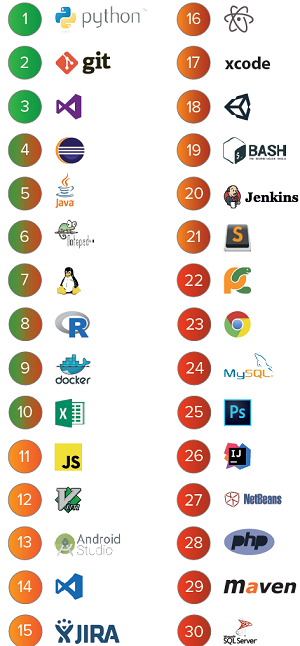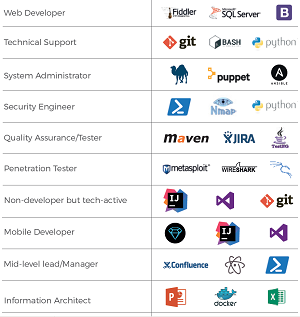News
Python, Docker, Big Data Highlight Skills Survey
- By David Ramel
- July 17, 2017
Packt Publishing Ltd. is out with its latest Skill Up report based on a worldwide survey of thousands of developers, finding that Python is the No. 1 dev tool, Docker generates the most interest in learning and Big Data specialists make the big bucks.
The tech-oriented publishing house earlier shared a sneak preview of the report -- based on a poll of more than 4,700 developers -- that showed Python had been named the No. 1 dev tool, and today the company followed up with more information on that versatile programming language.
"Its popularity has surged over recent years and it has clearly gained huge mainstream uptake due to its accessibility, fully featured standard library, rich ecosystem of libraries and frameworks, and highly engaged community," Packt said in a news release announcing publication of the "Skill Up 2017" report. "Joining Python in the top five are Git, Visual Studio, Eclipse and Java."
Furthermore, Packt said, "Python's popularity won't be waning any time soon -- it came in at second place as the tool to learn over the next 12 months. Python was pipped to pole position by Docker. With the growth of containerization, a surge in people learning Docker makes sense. Angular, Visual Studio, and Jenkins also make the top five."
 [Click on image for larger view.]
Top Tools (source: Packt Publishing)
[Click on image for larger view.]
Top Tools (source: Packt Publishing)
While Python is the most popular tool and Docker generates the most future interest, on the salary front there's one primary theme: Big Data. The top three moneymaking skills are Splunk, Hadoop and Kafka, with Chef (configuration management) and Kubernetes (container orchestration) rounding out the top five.
The inclusion of the latter two skills indicated to Packt that software infrastructure management and control is evolving into a high-value area. "DevOps is the unspoken trend here -- but maybe the term doesn't quite capture the broad scope of change that is happening," the report said.
Breaking down salary information by job role, the survey found that c-suite level managers made the most money, followed by Big Data engineers, mid-level leads/managers, security engineers and information architects. The bottom of the salary pack included hobbyists, game developers, academics, Web developers and tech support people.
 [Click on image for larger view.]
Tools that Lift Salaries Above Average (source: Packt Publishing)
[Click on image for larger view.]
Tools that Lift Salaries Above Average (source: Packt Publishing)
The survey also investigated what particular tooling skills boost the salaries of developers in different job roles -- for example, mobile devs get pay boosts by knowing Ruby, IntelliJ and Visual Studio -- and here Python again figures prominently.
"It's not a particular surprise -- in fact, we're well aware of its popularity at Packt," the report said. "But in this case, it's interesting to see that it's boosting the salaries of those in administrative roles and those working with infrastructure. It's likely that this is testament to Python's scripting power. In a world where automation and speed are becoming essential to modern tech professionals and their organizations, Python sits very comfortably -- and certainly makes you incredibly valuable."
Other data points lifted from the survey include:
- Full-stack development is dominating as a technical role across industries.
- 60 percent of respondents have either a 'reasonable amount of choice' or a 'significant amount of choice' over the tools they use at work.
- Job satisfaction doesn't correlate with salary.
- 28 percent of respondents believe software and technical expertise is used 'poorly' or 'very poorly.'
- 48 percent of respondents say their manager has less technical knowledge than they do.
- Developers need to work in an environment they love -- IDEs are among the most loved tools.
- 64 percent of respondents say that time is biggest barrier to their professional development.
- 63 percent of respondents say that we need diversity in the tech workforce.
- 40 percent of respondents dedicate time to learning every day -- a further 44 percent dedicate time once a week.
- Young tech workers are driven to build skills for their career but can lack motivation, and find it hard to find the right resources.
- When asked to list no more than three trends that will have the biggest impact over the next year, respondents replied most often with cloud computing; Big Data, artificial intelligence and machine learning; automation; and containerization.
"We've seen that real change is happening not within languages, and frameworks, but instead at a higher level," Packt concluded. "Machine learning, cloud and containerization, are all helping to transform the way tech professionals work and, indeed, the wider scope of what different roles are being asked to do and being asked to build."
Packt said the survey polled people in a variety of tech sectors, garnering 4,731 respondents from 43 different countries, most of whom were men 35 to 45 years of age working full-time on software solutions in the United States.
About the Author
David Ramel is an editor and writer for Converge360.